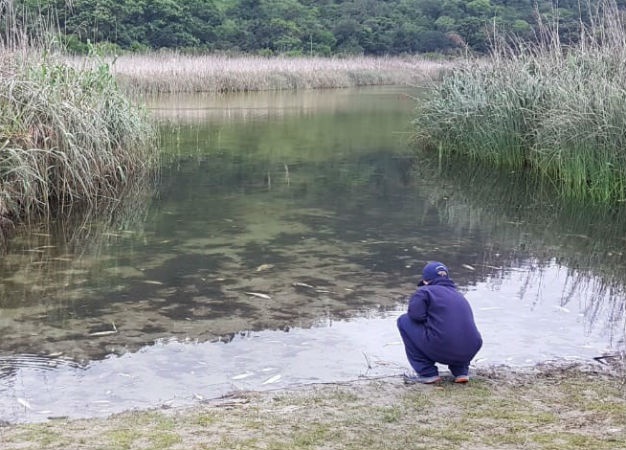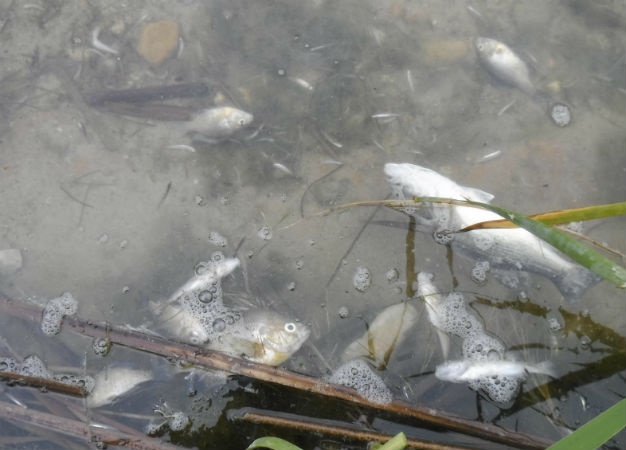2018-10-17 07:42
Duncan Alfreds
An expert examines the dead fish in the Groenvlei lake. (CapeNature)

Experts from CapeNature are puzzling over a die-off of fish in Groenvlei Lake in the Goukamma Nature Reserve, near Sedgefield.
On October 6, fish suddenly began dying in the natural lake, which is the only known South African habitat for genetically distinct populations of estuarine round herring and Cape silverside.
"Fish started dying on Saturday, 6 October, in small numbers followed by a bigger fish die-off between 8 to 10 October, when substantial numbers of largemouth bass, bluegill sunfish and indigenous fishes died," Marietjie Engelbrecht, CapeNature senior manager for communication services, marketing and eco-tourism told News24.
Two experts, CapeNature fish scientist Dean Impson and Dr Kevin Christison – a fish disease scientist of the Department of Agriculture, Forestry and Fisheries, visited the lake following reports of the die-off to try and understand the event.
"During this visit dead and decaying bass and bluegill were seen floating next to reed beds on the edge of Groenvlei, especially on its western shoreline.
"There were no fresh dead bass or bluegill, indicating that the major fish die-off had passed. Carp and tilapia seem to be unaffected by the fish die-off. These are very hardy fishes able to survive poor water quality conditions," said Engelbrecht.
'Destructive feeding habits'
Largemouth bass, bluegill sunfish, Mozambique tilapia and mosquitofish were legally stocked into the lake in the past for recreational fishing and to control mosquitoes.
While these alien fish species have created a balance with the indigenous fish, carp were illegally introduced in the 1990s, said CapeNature.
"While carp are a popular angling species, they are renowned worldwide for causing water quality problems through their destructive feeding habits. They have the ability to make clear water bodies such as Groenvlei more turbid with reduced aquatic plant beds, thereby changing the biodiversity and functioning of the aquatic food web," Engelbrecht said.
Impson said that fish die-offs are common throughout the world, though no cause for the current die-off has been identified.

Dead fish in Groenvlei lake. (CapeNature)
In 2016, 15 tons of dead carp were removed from Zeekoevlei in Cape Town.
Officials at the time suggested that the cause may have been related to the koi herpes virus.
"Mortality from natural causes is generally far more common and can be caused by many factors including oxygen depletion, toxic gases and substances, toxic algal blooms, turnover of the water column, sudden or excessive temperature changes, salinity changes, lightning, and diseases and parasites," said Engelbrecht of the Groenvlei die-off.
"Bacterial kills are seldom sudden and there is usually a gradual build-up of fish losses. Deaths caused by parasites and disease require histological examination by trained biologists or veterinarians."
Low water quality
However, she was also keen not to rule out man-made causes such the dumping of pesticides, fertilisers or other chemicals into the aquatic ecosystem.
These may cause a sudden decrease in oxygen in the water, and have a negative impact on the fish.
Data on the water from Garden Route District Municipality and SANParks indicated low water quality. Dissolved oxygen levels measured a low 3.9mg/L (milligrams per litre) and the water was also alkaline at a pH of 9.2.
According to environmental measurement systems, fish require minimum dissolved oxygen levels from 4mg/L to 15mg/L, while ideal alkalinity is a neutral pH of 7.
"The combination of elevated pH and low dissolved oxygen is a known fish stressor. There was also a strong smell of what may have been hydrogen sulphide, a known fish toxicant, which is produced by decaying animal and plant material," Engelbrecht said.
She added that carp numbers were of particular concern for CapeNature and in 2019, a post-doctoral study under the leadership of Dr Olaf Weyl of the South African Institute for Aquatic Biodiversity will commence.
Engelbrecht warned members of the public not to eat the fish.
https://www.news24.com/Green/News/myste ... d-20181017


